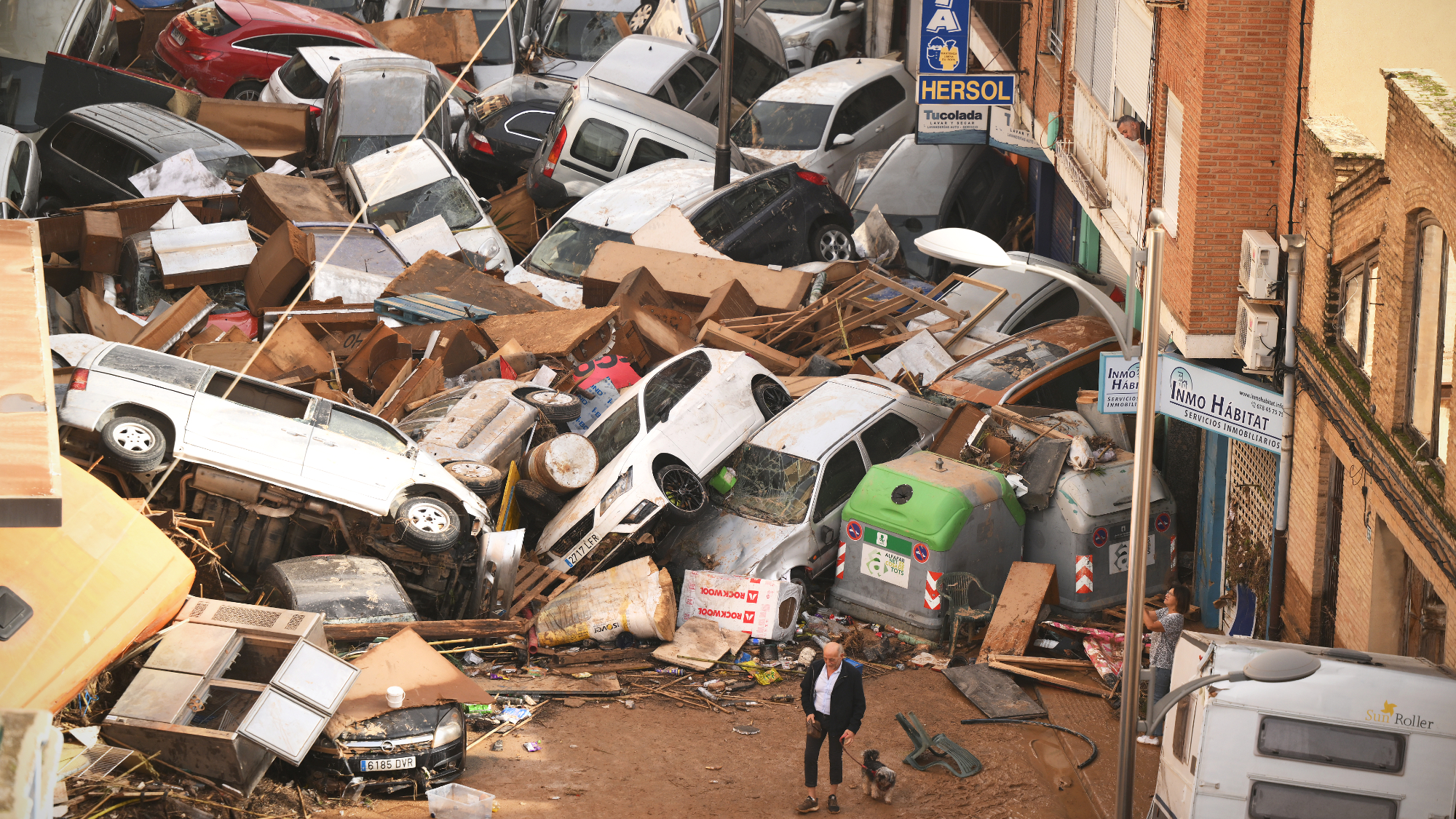At least 95 dead in Spain flash floods
Torrential rainfall caused the country's worst flooding since 1996


A free daily email with the biggest news stories of the day – and the best features from TheWeek.com
You are now subscribed
Your newsletter sign-up was successful
What happened
At least 95 people are dead in eastern and southern Spain and more are missing after torrential rainfall Tuesday and Wednesday caused the country's worst flooding since 1996. The death toll was expected to rise.
Who said what
"The whole of Spain weeps with you," Prime Minister Pedro Sánchez told Spaniards affected by the flooding. "We won't abandon you." Most of the reported deaths were in Valencia. Witnesses "described nightmarish scenarios" of flash floods "turning roads into rivers of floating cars and cutting off highways and access points," The Washington Post said.
The extreme weather was "the result of the gota fría — literally 'cold drop,'" said El País. This cold front dropping suddenly on the unusually warm Mediterranean Sea caused the worst stream of thunderstorms "of the 21st century." Andalusia "received four times the amount of rain typical for October in a single day," The New York Times said, citing Spain's meteorological agency, and in Valencia, the village of Chiva got "practically a year's worth" of rain in just eight hours.
The Week
Escape your echo chamber. Get the facts behind the news, plus analysis from multiple perspectives.

Sign up for The Week's Free Newsletters
From our morning news briefing to a weekly Good News Newsletter, get the best of The Week delivered directly to your inbox.
From our morning news briefing to a weekly Good News Newsletter, get the best of The Week delivered directly to your inbox.
The "disaster in Spain is the latest in a series of generational flood events across Europe and around the globe" that scientists partially attribute to climate change, the Post said. On the flip side, The Associated Press said, "a bone-dry October is pushing nearly half of the United States into a flash drought."
What next?
Sánchez declared three days of national mourning and promised affected towns that Spain will help "rebuild your houses, plazas, bridges."
A free daily email with the biggest news stories of the day – and the best features from TheWeek.com
Peter has worked as a news and culture writer and editor at The Week since the site's launch in 2008. He covers politics, world affairs, religion and cultural currents. His journalism career began as a copy editor at a financial newswire and has included editorial positions at The New York Times Magazine, Facts on File, and Oregon State University.
-
 The Week Unwrapped: Do the Freemasons have too much sway in the police force?
The Week Unwrapped: Do the Freemasons have too much sway in the police force?Podcast Plus, what does the growing popularity of prediction markets mean for the future? And why are UK film and TV workers struggling?
-
 Properties of the week: pretty thatched cottages
Properties of the week: pretty thatched cottagesThe Week Recommends Featuring homes in West Sussex, Dorset and Suffolk
-
 The week’s best photos
The week’s best photosIn Pictures An explosive meal, a carnival of joy, and more
-
 Earth is rapidly approaching a ‘hothouse’ trajectory of warming
Earth is rapidly approaching a ‘hothouse’ trajectory of warmingThe explainer It may become impossible to fix
-
 At least 8 dead in California’s deadliest avalanche
At least 8 dead in California’s deadliest avalancheSpeed Read The avalanche near Lake Tahoe was the deadliest in modern California history and the worst in the US since 1981
-
 The plan to wall off the ‘Doomsday’ glacier
The plan to wall off the ‘Doomsday’ glacierUnder the Radar Massive barrier could ‘slow the rate of ice loss’ from Thwaites Glacier, whose total collapse would have devastating consequences
-
 Can the UK take any more rain?
Can the UK take any more rain?Today’s Big Question An Atlantic jet stream is ‘stuck’ over British skies, leading to ‘biblical’ downpours and more than 40 consecutive days of rain in some areas
-
 As temperatures rise, US incomes fall
As temperatures rise, US incomes fallUnder the radar Elevated temperatures are capable of affecting the entire economy
-
 The world is entering an ‘era of water bankruptcy’
The world is entering an ‘era of water bankruptcy’The explainer Water might soon be more valuable than gold
-
 Climate change could lead to a reptile ‘sexpocalypse’
Climate change could lead to a reptile ‘sexpocalypse’Under the radar The gender gap has hit the animal kingdom
-
 The former largest iceberg is turning blue. It’s a bad sign.
The former largest iceberg is turning blue. It’s a bad sign.Under the radar It is quickly melting away
